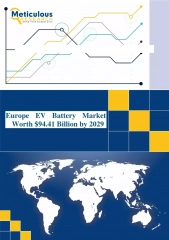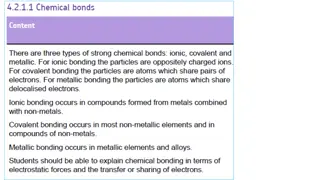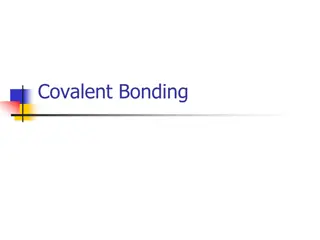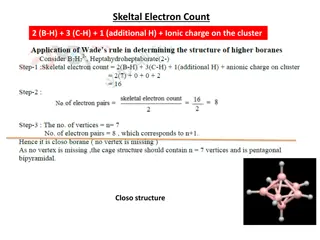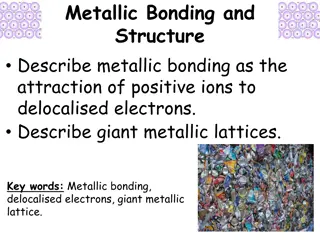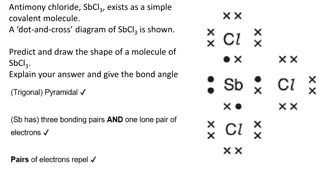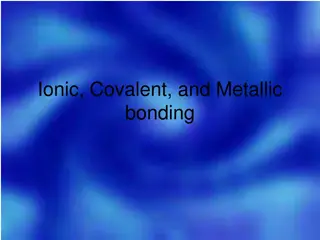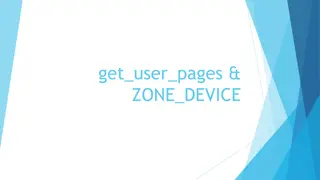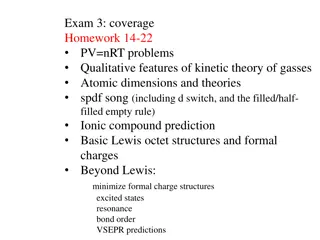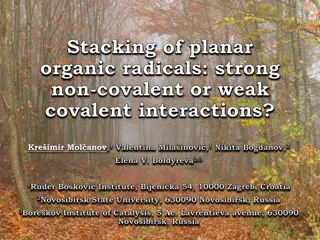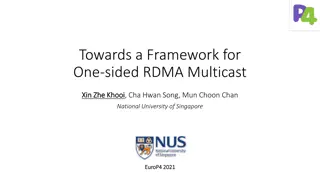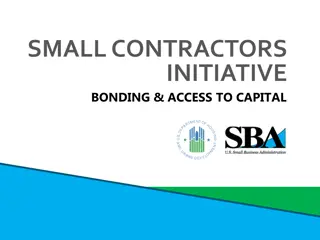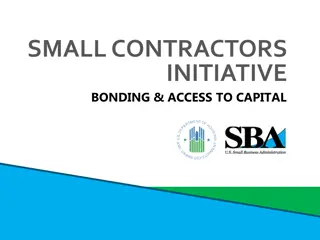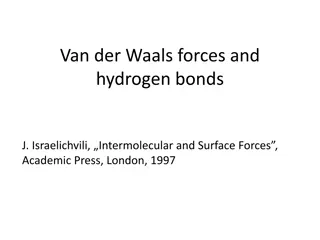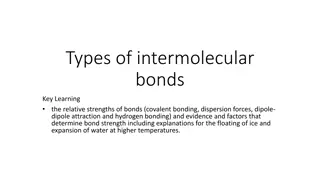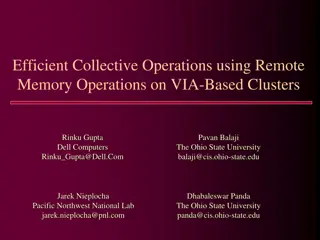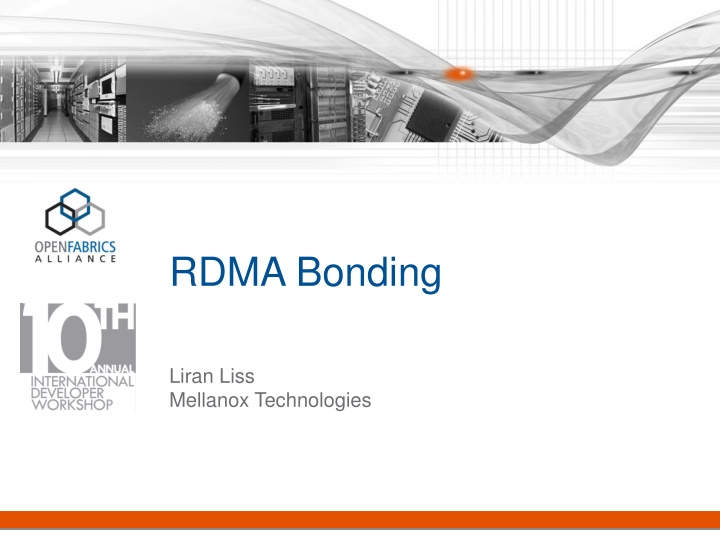
Innovative RDMA Bonding Technologies and Application Designs
Explore the cutting-edge RDMA bonding solutions presented at the #OFADevWorkshop in 2014, including transport-level and link-level bonding concepts, session-level bonding examples, and the idea of transport-level bonding with pseudo-HCAs. Discover how bonding improves bandwidth aggregation, communication flow distribution, and high availability in networking environments.
Download Presentation

Please find below an Image/Link to download the presentation.
The content on the website is provided AS IS for your information and personal use only. It may not be sold, licensed, or shared on other websites without obtaining consent from the author. If you encounter any issues during the download, it is possible that the publisher has removed the file from their server.
You are allowed to download the files provided on this website for personal or commercial use, subject to the condition that they are used lawfully. All files are the property of their respective owners.
The content on the website is provided AS IS for your information and personal use only. It may not be sold, licensed, or shared on other websites without obtaining consent from the author.
E N D
Presentation Transcript
RDMA Bonding Liran Liss Mellanox Technologies
Agenda Introduction Transport-level bonding RDMA bonding design Recovering from failure Implementation March 30 April 2, 2014 #OFADevWorkshop 2
Bonding (Link Aggregation) Bond together multiple physical links into a single aggregate logical link Motivation Aggregate bandwidth (active-active) Distribute communication flows across all active links High availability (active-backup) If a link goes down, reassign traffic to remaining links Can we do the same for HCAs? March 30 April 2, 2014 #OFADevWorkshop 3
Link-level Bonding Example: Ethernet link aggregation Typically accomplished by a Bonding pseudo network interface Placed between the L3/4 stack and physical interfaces Multiplexes packets across stateless network interfaces Transparent to higher levels of the stack Transport is implemented in SW Application Sockets TCP UDP IP Packets Bonding netdev1 netdev2 RDMA challenge Transport implemented at stateful network interfaces (HCAs) subnet1 March 30 April 2, 2014 #OFADevWorkshop 4
Session-level Bonding Example: iSCSI Initiator establishes a session with Target Session may comprise multiple TCP flows Connections are completely encapsulated within the iSCSI session OS issues SCSI commands Alternatively, multiple sessions may be created to the same target/LUN May be presented as single logical LUN by multi-path SW SCSI subsystem SCSI CMDs iSCSI HBA I-T Session TCP2 TCP1 RDMA challenge Transport connections visible to ULPs Multiple RDMA consumers netdev1 netdev2 subnet1 March 30 April 2, 2014 #OFADevWorkshop 5
Idea: Transport-level Bonding Provided by a pseudo-HCA (vHCA) Applications open virtual resources vPDs, vQPs, vSRQs, vCQs, vMRs Mapped to physical resources by vHCA Namespace translated on the fly Similar to transparent RDMA migration IBM/OSU Nomad paper VMware vRDMA Oracle live-migration prototype Application RDMA HAL and services Verbs Bonding HCA driver Link aggregation Distribute QPs across HCAs Optionally bond different HCA types Upon failover Reconnect over a different device/port Continue traffic from the point of failure Transparent migration is a special HA case RoCE HCA IB HCA subnet1 subnet2 March 30 April 2, 2014 #OFADevWorkshop 6
Requirements Support aggregate across different physical HCAs Optionally even different device types HW independent Bonding driver Strict semantics Adhere to transport message ordering guarantees Global visibility of all IO operations Transparent to consumers Including failover events High performance March 30 April 2, 2014 #OFADevWorkshop 7
Design User-space solution Bond driver is a Verbs provider Uses RDMACM internally To open connections Negotiate state using private data IP addressing GID = IP QPN = Port number HCA identity = alias IP 1:1 virtual physical QP mapping Leverage HW ordering guarantees Zero copy messages Fast path done in app context Post_Send(), Post_Recv(), PollCQ() Application rdmacm libibvers Vendor driver1 Vendor driver2 RDMA bond U K Kernel drivers March 30 April 2, 2014 #OFADevWorkshop 8
Object Relations (Example) RDMA Bond vQP1 vQP2 Listener RDMA ID Listener RDMA ID vRKey RKey vRKey RKey vRQ vRQ vSQ vSQ 1 635 1 201 Connection RDMA ID Connection RDMA ID 2 145 2 36 vPD1 vMR2 vMR1 vCQ1 HCA1 QP3 HCA2 QP9 MR2 CQ17 MR2 CQ69 PD83 PD24 March 30 April 2, 2014 #OFADevWorkshop 9
Posting WRs If vQP is not in a suitable state or virtual queue is full Return immediate error Enqueue WR in virtual Queue If associated HW Send / Receive queue is full Return with success For Sends If connection is not active Schedule (re)connection and return with success For UD Resolve AH and remote QPN (if not already cached) For RDMA Resolve RKey (if not already cached) For Receives If connection is not active, return with success Translate local SGE Post to HW March 30 April 2, 2014 #OFADevWorkshop 10
Polling Completions Poll next HW CQ associated with vCQ If not empty, process according to status Case IBV_WC_RETRY_EXC_ERR Schedule reconnection for associated vQP Ignore completion Case IBV_WC_WR_FLUSH_ERR Ignore completion Case IBV_WC_SUCCESS Report successful completion Default (any other error) Modify vQP to error Report erroneous completion Add corresponding virtual Queue to CQ error list Poll next virtual queue on error list If it has in-flight WQEs Generate ERROR_FLUSH for next WQE Report CQ empty if none of the above applies March 30 April 2, 2014 #OFADevWorkshop 11
RC Failure Recovery Re-establish connection Over any active link and device Negotiate last committed operations Generate corresponding completions Rewind physical queues Resume operation Physical producer Virtual consumer Virtual consumer virtual producer Physical producer Send Queue Receive Queue virtual producer March 30 April 2, 2014 #OFADevWorkshop 12
RC Failure Recovery Re-establish connection Over any active link and device Negotiate last committed operations Generate corresponding completions Rewind physical queues Resume operation Physical producer Virtual consumer Virtual consumer virtual producer Physical producer Send Queue Receive Queue virtual producer March 30 April 2, 2014 #OFADevWorkshop 13
RC Failure Recovery Re-establish connection Over any active link and device Negotiate last committed operations Generate corresponding completions Rewind physical queues Resume operation Virtual consumer Virtual consumer virtual producer Send Queue Receive Queue virtual producer March 30 April 2, 2014 #OFADevWorkshop 14
RC Failure Recovery Re-establish connection Over any active link and device Negotiate last committed operations Generate corresponding completions Rewind physical queues Resume operation Virtual consumer Virtual consumer virtual producer Send Queue Receive Queue virtual producer March 30 April 2, 2014 #OFADevWorkshop 15
RC Failure Recovery Re-establish connection Over any active link and device Negotiate last committed operations Generate corresponding completions Rewind physical queues Resume operation Physical producer Physical producer Virtual consumer Virtual consumer virtual producer Send Queue Receive Queue virtual producer March 30 April 2, 2014 #OFADevWorkshop 16
Implementation (Ongoing) Current status POC implementation Supported objects CQs PDs RC QPs MRs Supported operations Resource manipulation Send-receive data traffic QPs limited to single link Tackle transient link failure Next steps Complete Verbs coverage RDMACM integration Multi-link recovery Continuously negotiate active links Aggregation schemes HA RR Static load balancing Dynamic load balancing March 30 April 2, 2014 #OFADevWorkshop 17
Summary Bonding solution for stateful RDMA devices HW agnostic Aggregates ports from different devices Communicating peers must run the Bonding driver Out-of-band protocol via CM MADs Supports High availability Aggregate BW Load balancing Transparent migration Efficient user-space implementation Could be extended to the kernel in a similar manner March 30 April 2, 2014 #OFADevWorkshop 18
Thank You #OFADevWorkshop

